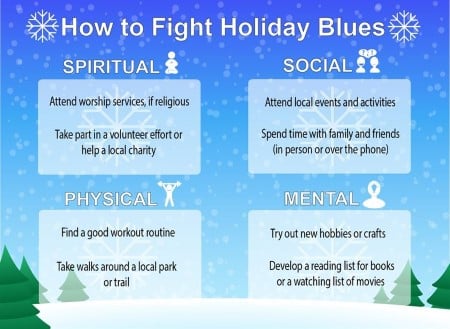Holiday Self-care
Posted On: Tuesday, December 11, 2018
Posted By: Ian Lane

Holidays can be a difficult time for anyone. In some ways, they are a time of plenty and meaning, but they can also a be source of stress. This can be particularly challenging for those of us struggling with mental health conditions like anxiety and depression. Thankfully, there are some ways of easing this stress and increasing our capacity to adapt to various emotional demands in the environment. The following are three examples which could be helpful as we enter the holiday season.
First and foremost, despite all labels and diagnoses, we are people. Our mental health conditions do not define us. Our very real symptoms, however, can be distressing and overwhelming at times, and sometimes worsen around the holidays — especially when these holidays fall on cold, dark Winter nights. Therefore, the first step is to be mindful of the ways we speak to ourselves. Negative self-talk, and destructive thinking more broadly, seems to follow a roundabout that never stops. This repeating loop is sometimes the first step off this cliff into despair, and the sooner we can recognize we are doing it, the more quickly we may be able to avoid that fall. Do not aim for perfection; simply become aware of defeating beliefs, notice when they bubble up to the surface, and then do your best to let them go. (It helps to write them down while working through them.)
Second, even people who do not identify as having a mental health condition can find themselves lonely and isolated during the holidays. When someone suffers from symptoms of major depression, these feelings can be drastically heightened. In some sense, it is a little like the volume gets turned way up on the emotional pain. This isolation may sometimes be self-inflicted, however. Although we sometimes trick ourselves into believing it i s for good reason, this speaks back to destructive self-talk, when precisely what we need, instead, is to spend quality time with the ones we love. Let us all get together with our closest friends and allies this holiday season. (A lovely and brilliant colleague of mine in the Transitions ACR has a placard above her desk which reads Don’t believe everything you think. Let this sentiment guide you this holiday season and treat yourself with the love and respect you deserve.)
Lastly, much of what we experience during a depressive episode occurs because of spending too much time in our own heads. For instance, we spend a large amount of time and energy questioning ours and others’ feelings, beliefs, motivations, and values. We become focused on the past and worried about the scary and unknown future. And we spend very little time physically moving around. Getting enough vigorous exercise has been shown to improve symptoms of many mental health conditions, including the emotional distress that occurs with bouts of anxiety and depression. Whether it is hiking, going to the gym, or taking a yoga class, dedicating some personal time to explore the world beyond the walls of one’s own mind may be a helpful way of decompressing and reducing symptoms.
Many people feel an increase in their mental health symptoms around the holidays. It is nothing to be ashamed of, and some of this is just run-of-the-mill stress due to difficult circumstances. But, just as there are reasons for this uptick in symptoms, there are also means of managing the storm. These suggestions may not work for everyone all the time, but, whatever variation of them works for you, remember to at least be kind to yourself; set aside some quality time for loved ones; and fit in a little exercise to calm your body and mind
